“Somber love.”
According to senior Cash Newton, who plays Lord Capulet, these are the two words that best describe the Loy Norrix production of “Romeo and Juliet.”
On Feb. 15, 16, 17, and 18, students will perform the play that has become the pinnacle in pop culture iconography. Featuring students of all ages, genders, and ethnicities, the show brings together the school community and highlights the talent of students in the theater department.
While most students read Shakespeare’s play in their freshman English classes, this production brings new life and dimension to the renowned work. Between the talented actors and crew, it is a performance worth seeing.
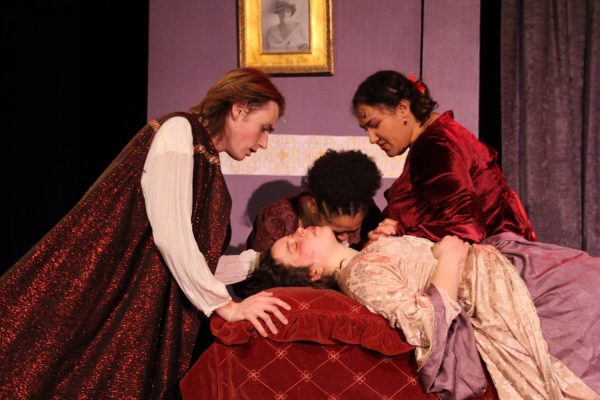
No matter whether they had a lead role or a more minor one, each actor’s compelling performance lends a personal spin to the characters and draws the audience in. Each character has their own unique mannerisms and qualities, but none are so overpowering as to minimize any others.
Of course, the most emotionally impactful performances come from seniors Sophia Wrzesinksi and Sam Davis, who play Romeo and Juliet.
“I tried my best to really understand her character, to kind of understand how she would think in order to add my own spin onto it,” explained Wrzesinksi. “I knew I wanted to play her kind of younger.”
While Wrzesinski’s powerful delivery and playful character building added an element of humor to the performances, Davis’s somber portrayal of Romeo reminds audiences that at its core, the play is a tragedy.
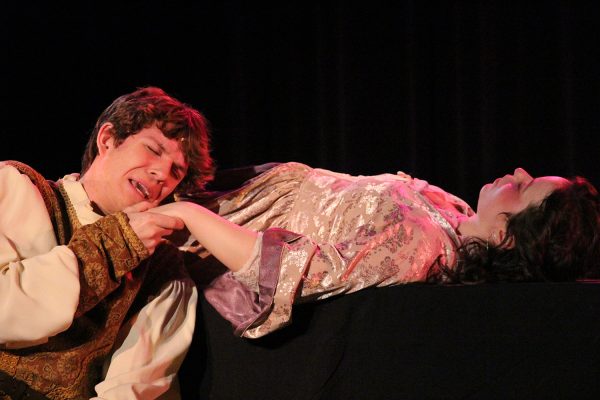
For both leads, one of the most important parts of portraying their characters was being able to make the characters their own, letting them stand out from past iterations of the play.
“This part has been played by so many people: nobody wants to see the same person do the same thing,” said Davis. “I’m being my own Romeo, how Sam Davis would play him.”
The leads, however, aren’t the only exemplary performances. The dynamics between the two and those closest to them draws parallels between character relationships within both families.
For the Capulets, Juliet’s emotionally-charged performance is juxtaposed against Hana Westrick’s performance as the Nurse. Unlike other portrayals of the character where the nurse is very old, Westrick brings a fiery spirit to the archetypal mother figure, adding a new dimension to a character who has previously been overlooked in movie adaptations.
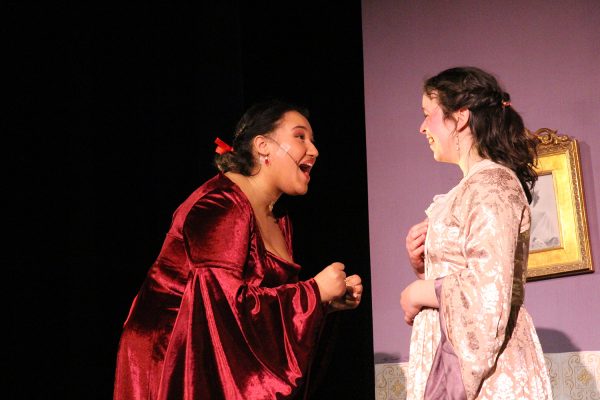
When partnered with Wrzesinski’s Juliet, the two create a powerful duo that brings a feeling of female solidarity and strength to the plot.
Similarly, the performances by Felix Bahrou and Edward Aguilar as Mercutio and Benvolio complement Davis’s Romeo. While Romeo broods over Rosaline, Mercutio and Benvolio’s lighthearted, energetic performances brighten the mood. Even as Mercutio is impaled on Tybalt’s blade, Bahrou’s humorous performance comes to a peak when he utters “ask for me tomorrow and you’ll find a grave man” as he stumbles to the floor.
The famous death scene shatters expectations of a high school production, with both Wrezinski and Davis giving powerful and emotional performances. Romeo’s grief upon finding Juliet is palpable, and Juliet’s death is operatic. The vision of two lovers lying together in death is worthy of being painted. The dramatic dagger death was beautiful and the devouring of a vial of poison was very entertaining to watch.
Dan Lafferty directed the show with a sense of humor and aimed for a more melodramatic feel.
“I wanted it kind of soap opera-esque,” Lafferty said. “Really big emotions.”
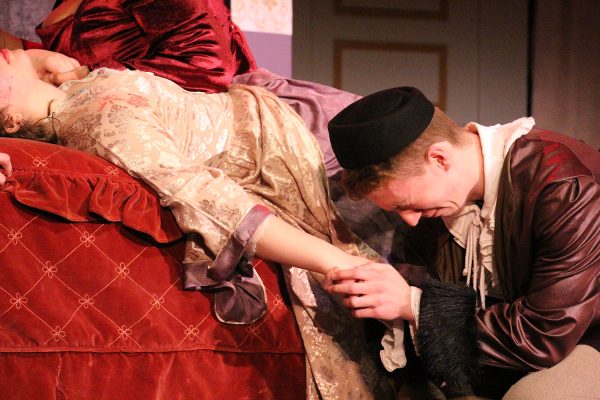
The play was an artful mix of classic visuals and tropes that have ingrained themselves in the collective consciousness, as well as self-aware humor and fun nods to the present day. In the background of famous scenes like the masquerade ball, songs by Lady Gaga or Radiohead accompanied the star-crossed lovers of Verona.
Of course, the production wouldn’t have been possible without a talented crew. Stage managers Nina Holm and Carter Moon handled general organization and called cues, while Max Achenbach, the assistant director, helped Lafferty block scenes and worked with actors to develop their characters.
The crew’s dedication shines through in the play’s lighting, costuming and sound. As actors quip and quarrel, the lighting changes accordingly. A glaring red light is used for emotional scenes, while soft white lights are used for Romeo and Juliet’s scenes.
The costumes, as selected and altered by sophomore Rosalie Hill, are also a highlight of the show.
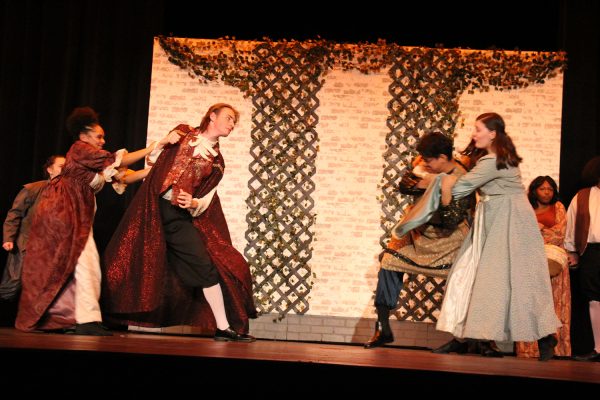
“For this one, I looked at other costumes for Romeo and Juliet and also old fashioned drawings from the Medieval and Renaissance times and tried to get inspiration from that,” said Hill. “It’s not entirely historically accurate, but I did my best.”
Historical accuracy aside, some of the best costumes of the show were Lord Capulet’s glittering cape, and of course, Juliet’s cream and lilac dress. Hill’s choices feature billowing sleeves and dramatic colors, giving a whimsical Renaissance feel. Additionally, the consistency in color symbolism makes characters easily identifiable, with most Capulets appearing in red, while the Montagues appear in blue.
As Romeo and Juliet isn’t a musical, like Oklahoma was, the crew has had a different experience this season, especially with less time to prepare the performance.
“It’s a smaller cast which is nice, a little more tight knit,” said Holm. “No big music numbers, just one dance.”
Still, performing Shakespeare comes with its unique challenges: namely, the language. The entirety of the script is in Elizabethan English, with the majority written in unrhymed iambic pentameter. For actors, the language was one of the largest hurdles.
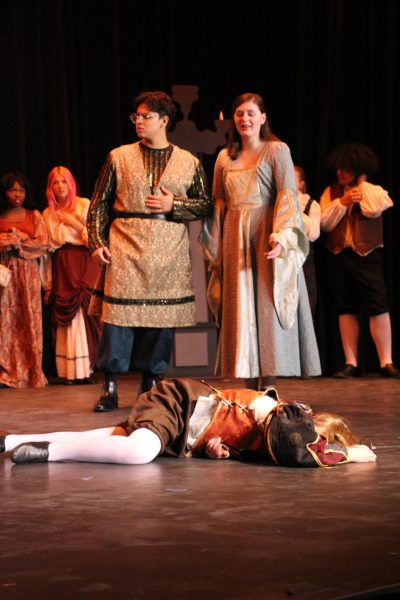
“I thought it would be much easier to memorize because it’s in verse form, but it’s way harder because it doesn’t really make sense when you’re reading it,” said Davis.
Most of Lafferty’s concerns also centered around language.
“The language and learning the lines made it extra difficult, since it’s not just everyday language,” said Lafferty “but they put in a lot of work, and I’m just really proud.”
Despite the cast and crew’s concerns, no language barrier was evident in the performance. Lines were delivered crisply and any errors were imperceptible to the audience. Shakespeare’s hallmark iambic pentameter prevails through the performance, with multiple actors skillfully navigating the meter and syllabic stress.
The entire show was a good mix of famous lines like “wherefore art thou Romeo?” and old-timey words that need to make a comeback. After the play, Norrix will hopefully start to see inspired students yelling “harlot” and “scurvy knave” as they bite their thumbs rather than using the boring profanity of modern day.


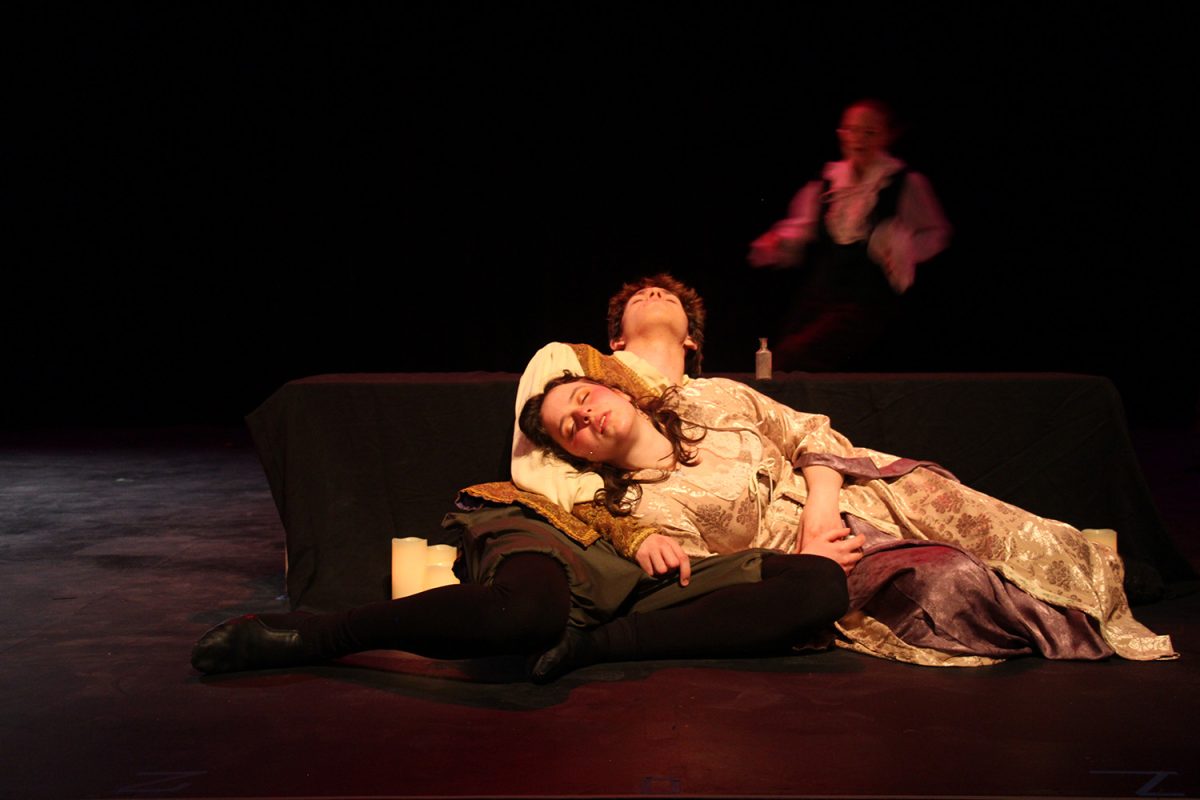


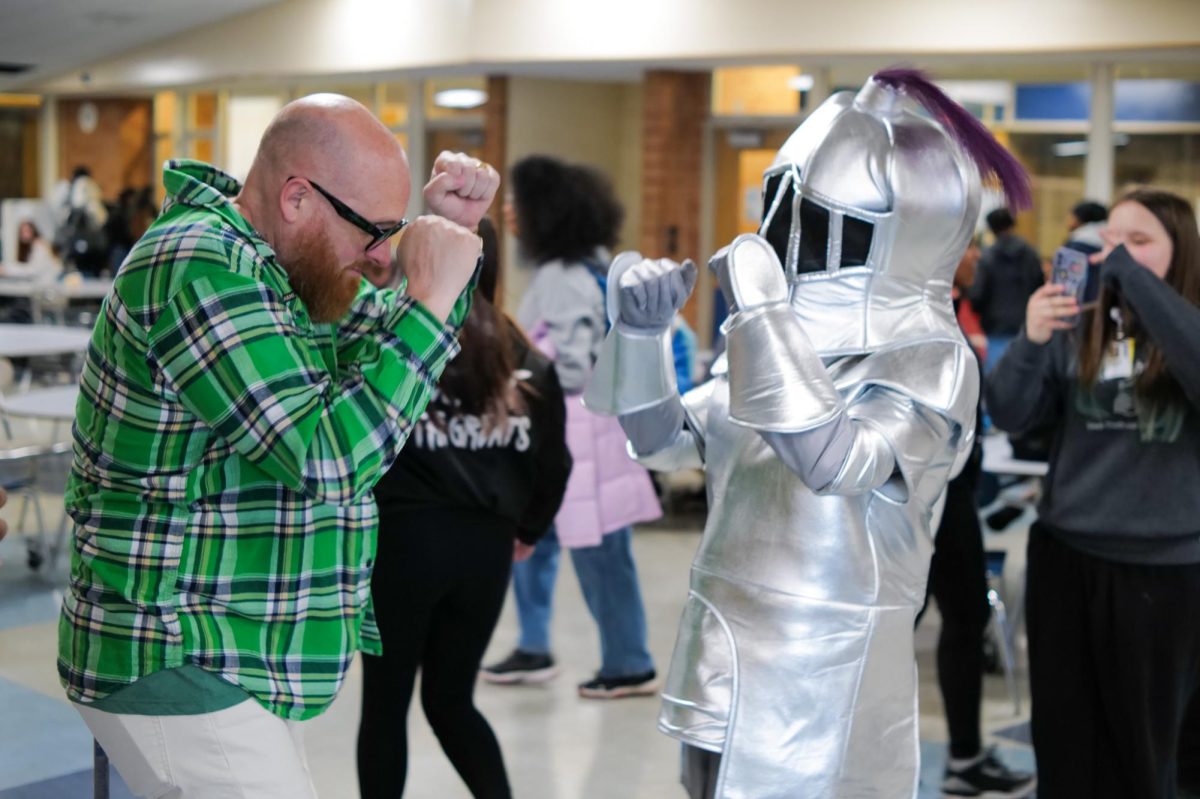


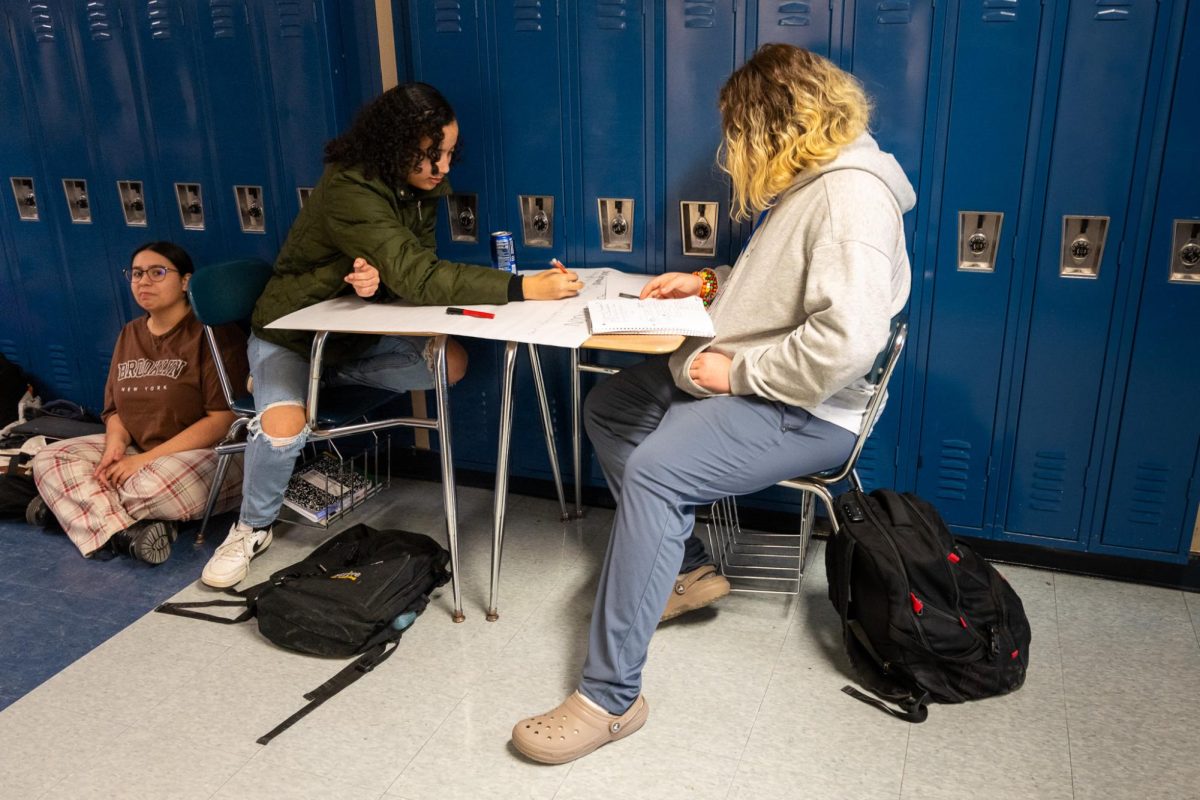


Emma • Apr 17, 2024 at 2:43 pm
i love this article and i saw the play and it was so good well-written and the play was well-betrayed
Rosie Hill • Feb 16, 2024 at 10:28 am
so well written! I love the discriptive language
Capulet • Feb 15, 2024 at 10:51 pm
Verily, what a marvelous article! The selection of words doth enchant and captivate mine soul. We sha’ll do up our tresses, show thy knickers and make hast to Romeo and Juliet.
Edward Aguilar • Feb 15, 2024 at 4:12 pm
Wow! This article was so wonderful to read!!